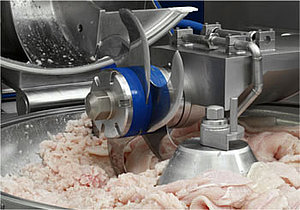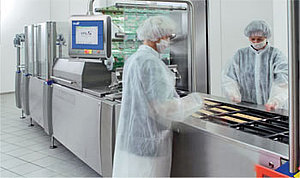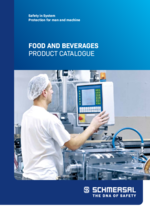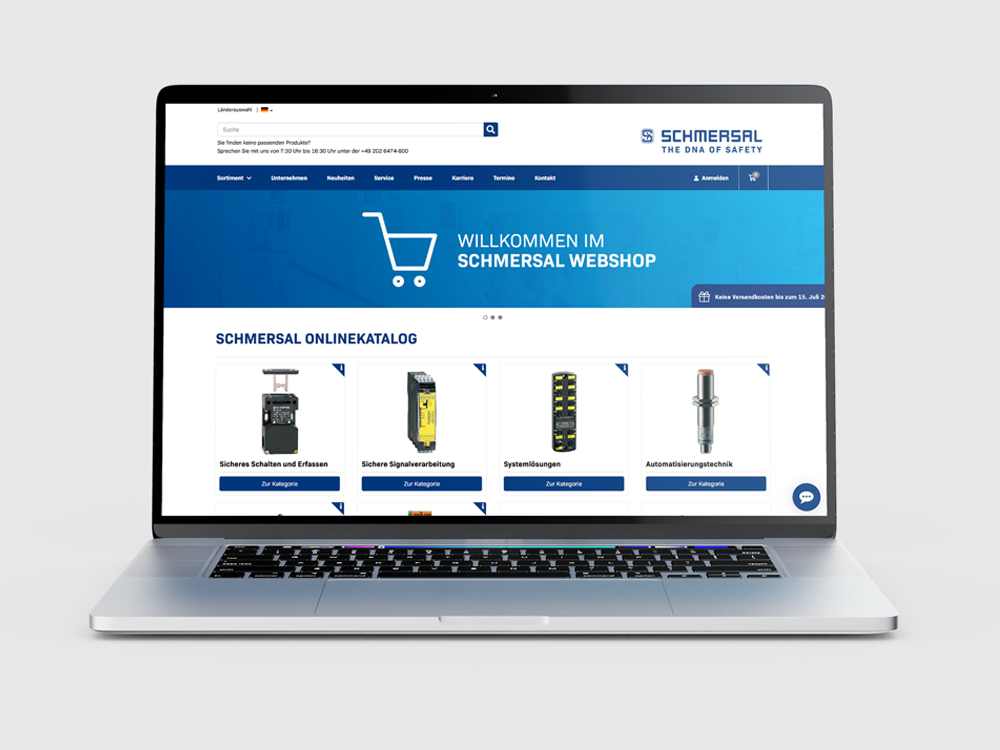You are here
Content
Harvesting, drying, filleting, heating, shredding, crushing, mixing, filling, packing: The food-processing industry includes many, usually mechanically performed process steps. During these process steps, the standards and directives with regard to machinery safety must be observed. Moreover, the food-processing industry in particular has other fields of activity as well, where the selection of switchgear or command devices at the man-machine interface is highly important.
Hygiene
Hygiene is a key issue in the food-processing industry. Four hygienic zones can be distinguished, for which strictly defined constructive details of the "hygienic design" are applicable:
- Dry zone (non-contact area; protection against soiling required)
- Splashing zone (foodstuff can splash; the operators touch the foodstuff and the machines; risk of contamination or cross contamination)
- Wet zone (high risk of bacterial contaminations; low-pressure cleaning with chemicals or hot cleaning)
- Aggressive zone (even higher risk of contamination; frequent hot steam cleaning or high-pressure cleaning with aggressive detergents)
The Hygienic Design also influences the choice of safety switchgear. An example: the food-processing industry was the first branch which used safety sensors instead of the conventional electromechanical safety switches. These non-contact safety switchgear are easier to clean due to smooth surfaces of the sensor and the actuator and, in many cases, can be concealed mounted.
Humidity, moisture and detergents
Stringent hygienic standards are applicable to those components or periphery of food processing machinery, which are in contact with the product; as a result, the safety switchgear and actuating elements must meet the highest requirements as their protection class is regarded. Many series therefore are IP69K. These switchgear must be able withstanding a water jet of at least 80 bar with a temperature of 80°C.
Temperature resistance
In frozen storage or in case of shock freezing - to name two examples - automated processes take place at temperatures below the freezing point. Even more frequent are the processes, for which high temperatures are inevitable, e.g. evaporation, homogenization, drying, condensation, and distillation. Switchgear, which are used for these processes, must be accordingly high- and low-temperature resistant.
Branch-specific certifications

The specific characteristics to be featured by machinery and plants destined to the food processing industry are laid down in different regulations, which also concern the individual machinery and plant components and which are in part very demanding. This includes, amongst others, the following standards and approvals according to the following standards:
- EN 1672-1 and EN 1672-2
- 3A Sanitary
- Ecolab
- EHEDG
- FDA
- HACCP
Switchgear from Schmersal is approved and certified in accordance with these regulations depending on the requirements.
Long lifetime and availability
In food production, machinery and plants often operate with short cycles and in a three-shift operation in interlinked plants. The expected availability is accordingly high. Schmersal switchgear meet these requirements. They stand the test in various applications, even under unfavorable ambient conditions.
Explosion protection
When mixed to air in a particular proportion, all organic dusts are inflammable. Therefore, the regulations of the dust explosion directive must be observed e.g. when filling/bottling and storing powdered food products and their primary products (flour, baking mixtures, pudding powder, coffee and cacao powder). The Schmersal Group offers a comprehensive range of switchgear for automation and machine safety, which is approved and certified to the ATEX and IECEx Directives.
Industry related knowledge
Internationally, Schmersal aims at establishing good contacts and exchanging experiences with food-processing machinery builders, so that new switchgear is developed and individual consultations are provided with the highest level of expertise. To that effect, Schmersal is a member of the German "Packaging Excellence Center" (PEC). This Center of Competence for packaging and automation technology unites many companies which are manufacturing machinery and plants for the food packaging industry.
Context Column
Contact
To learn more about our products associated with this industry, order a print catalog or have a Schmersal representative contact you, please use our contact form.
ARTICLES
Technical articles on US and Canadian issues:
Sanitary And Hygienic Design Standards
An overview of US and Canadian standards for food industry
Hygiene and sanitation are key issues in the food processing industry to prevent food borne illnesses. It influences the design of machines used in areas that need to be constantly cleaned. It is important when selecting safety devices or command devices for food processing machines that they meet hygienic or sanitary standards.
Food Safety Modernization Act (USA)
Equipment and Control Designs for FSMA
The new Food Safety Modernization Act legislation demands stricter proactive measures to prevent hazards that could affect food within that facility. One of those measures deals with the hygienic designs of the equipment and controls.








